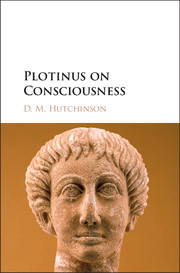Book contents
- Plotinus on Consciousness
- Plotinus on Consciousness
- Copyright page
- Dedication
- Contents
- Acknowledgments
- Notes on the Text
- Introduction
- Chapter 1 Self
- Chapter 2 Consciousness Terms
- Chapter 3 First Layer
- Chapter 4 Second Layer
- Chapter 5 Third Layer
- Chapter 6 Self-Determination
- Chapter 7 Conclusion
- Appendix
- Bibliography
- General Index
- Index Locorum
Introduction
Published online by Cambridge University Press: 24 April 2018
- Plotinus on Consciousness
- Plotinus on Consciousness
- Copyright page
- Dedication
- Contents
- Acknowledgments
- Notes on the Text
- Introduction
- Chapter 1 Self
- Chapter 2 Consciousness Terms
- Chapter 3 First Layer
- Chapter 4 Second Layer
- Chapter 5 Third Layer
- Chapter 6 Self-Determination
- Chapter 7 Conclusion
- Appendix
- Bibliography
- General Index
- Index Locorum
Summary
- Type
- Chapter
- Information
- Plotinus on Consciousness , pp. 1 - 5Publisher: Cambridge University PressPrint publication year: 2018



